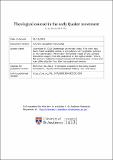Files in this item
Theological counsel in the early Quaker movement
Item metadata
| dc.contributor.author | McArthur, Euan David | |
| dc.date.accessioned | 2022-11-01T17:30:03Z | |
| dc.date.available | 2022-11-01T17:30:03Z | |
| dc.date.issued | 2023-01-01 | |
| dc.identifier | 281905790 | |
| dc.identifier | e680aeda-bf92-4807-8f84-2d22ef8397df | |
| dc.identifier | 000877819500001 | |
| dc.identifier.citation | McArthur , E D 2023 , ' Theological counsel in the early Quaker movement ' , Journal of Ecclesiastical History , vol. 74 , no. 1 , pp. 68-89 . https://doi.org/10.1017/S0022046922001038 | en |
| dc.identifier.issn | 0022-0469 | |
| dc.identifier.other | ORCID: /0000-0002-3945-294X/work/122216174 | |
| dc.identifier.uri | https://hdl.handle.net/10023/26288 | |
| dc.description.abstract | Early Quakers have not typically been noted for their espousal of political counsel. This article proposes that its cohort powerfully made the case for the ‘counsel of God’ in politics. This counsel was, perhaps paradoxically, both intensively inward, deriving from the light of God within, and universalistic and external, given that counsel could emanate from any individual. This was distinct from most contemporary applications of conciliar rhetoric, although some conceptual and practical similarities are considered. This article explores, finally, the diversity of seventeenth-century conceptions of theological and political counsel alongside that of the Quakers, suggesting further directions for research. | |
| dc.format.extent | 22 | |
| dc.format.extent | 285484 | |
| dc.language.iso | eng | |
| dc.relation.ispartof | Journal of Ecclesiastical History | en |
| dc.subject | BX Christian Denominations | en |
| dc.subject | T-NDAS | en |
| dc.subject | AC | en |
| dc.subject | NIS | en |
| dc.subject | MCC | en |
| dc.subject.lcc | BX | en |
| dc.title | Theological counsel in the early Quaker movement | en |
| dc.type | Journal article | en |
| dc.contributor.institution | University of St Andrews. School of History | en |
| dc.identifier.doi | https://doi.org/10.1017/S0022046922001038 | |
| dc.description.status | Peer reviewed | en |
This item appears in the following Collection(s)
Items in the St Andrews Research Repository are protected by copyright, with all rights reserved, unless otherwise indicated.

